

Open and Shut? I was asked recently by open science advocate and historian Michał Starczewski if I would do a Q&A on open access for the Otwarta Nauka site based at the University of Warsaw.
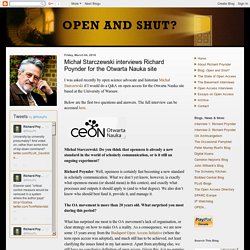
Below are the first two questions and answers. The full interview can be accessed here. Michał Starczewski: Do you think that openness is already a new standard in the world of scholarly communication, or is it still an ongoing experiment? Richard Poynder: Well, openness is certainly fast becoming a new standard in scholarly communication. What we don’t yet know, however, is exactly what openness means (or should mean) in this context, and exactly what processes and outputs it should apply to (and to what degree).
The OA movement is more than 20 years old. What has surprised me most is the OA movement’s lack of organisation, or clear strategy on how to make OA a reality. I think there are two main reasons for the failure of the OA movement to take a more structured approach. Why I won’t be doing that video interview about open access. Recently I was contacted by Library Journal (LJ) in connection with a series of video interviews it is conducting with open access “VIP’s and leaders”.
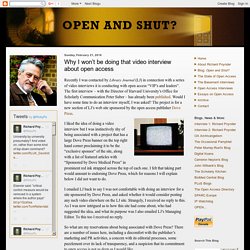
The first interview – with the Director of Harvard University’s Office for Scholarly Communication Peter Suber – has already been published. Would I have some time to do an interview myself, I was asked? The project is for a new section of LJ’s web site sponsored by the open access publisher Dove Press. I liked the idea of doing a video interview but I was instinctively shy of being associated with a project that has a large Dove Press banner on the top right hand corner proclaiming it to be the “exclusive sponsor” of the site, along with a list of featured articles with “Sponsored by Dove Medical Press” in prominent red ink strapped across the top of each one. I felt that taking part would amount to endorsing Dove Press, which for reasons I will explain below I did not want to do. Marketing and editorial There is no reason to doubt this. 232204E. Bibliothèque numérique. Protocole OAI-PMH.
Attitude des pays européens vis-à-vis du libre accès. Publié le 7 mars, par Thérèse HAMEAU Le rapport « Access to and Preservation of Scientific Information in Europe » fait un point sur le suivi de l’implémentation dans les états membres de l’Union européenne — plus la Norvège et la Turquie — des recommandations de la Commission de juillet 2012.Concernant le libre accès (LA) aux publications, douze états montrent une préférence pour la voie verte , la voie dorée est privilégiée dans cinq pays et les autres états soutiennent les deux options.Les politiques en faveur du libre accès aux données de la recherche sont moins développées, mais il existe une prise de conscience de l’enjeu avec la mise en œuvre de politiques dans des pays comme le Danemark, la Finlande et la France.À propos de la conservation des informations scientifiques, un autre point des recommandations, les archives institutionnelles se sont développées dans la plupart des états.
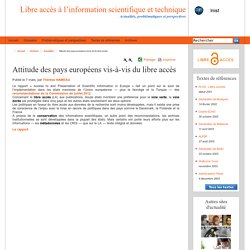
Le rapport. Hashtag #openaccess sur Twitter. Find - Directory of Open Access Repositories. Search or Browse for Repositories <intR>²Dok "Ergani - Historical Archive of Aegean" Repository 4TU.Centre for Research Data AAB College repository Aaltodoc Publication Archive ABACUS.
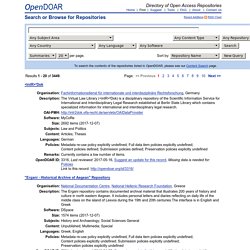
Aberdeen University Research Archive (AURA) Abertay Research Collections CADAIR (Aberystwyth University Repository) ABU Zaria Research Publications Academic Digital Library (Akademickiej Bibliotece Cyfrowej) (ABC - KRAKÓW) Academic Research Repository at the Burgas Free University (Научен портал на Бургаския свободен университет) ARRChNU (Academic Research Repository at the ChNU) Find - Directory of Open Access Repositories. 232201E. UNESCO’s Open Access (OA) Curriculum is now online. Within the overall framework of the organization’s strategy on OA, the recent launch of OA curricula for Researchers and Library Schools by UNESCO highlights its efforts for enhancing capacities to deal with Open Access issues.
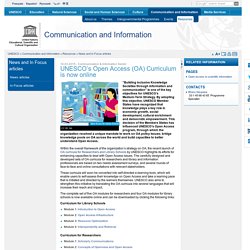
The carefully designed and developed sets of OA curricula for researchers and library and information professionals are based on two needs assessment surveys, and several rounds of face-to-face and online consultations with relevant stakeholders. These curricula will soon be converted into self-directed e-learning tools, which will enable users to self-assess their knowledge on Open Access and take a learning pace that is initiated and directed by the learners themselves.
UNESCO also aims to strengthen this initiative by translating the OA curricula into several languages that will increase their reach and impact. Curriculum for Library Schools Curriculum for Researchers <- Back to: News articles.